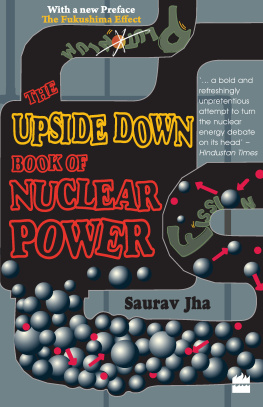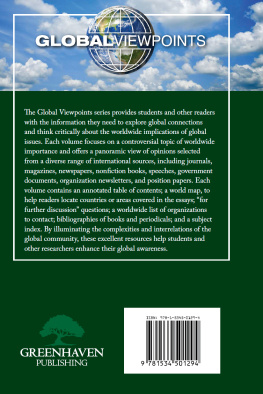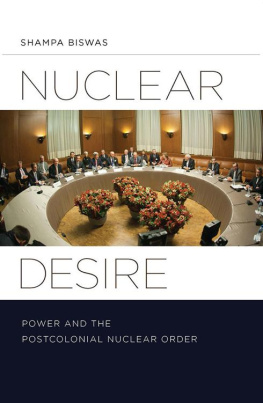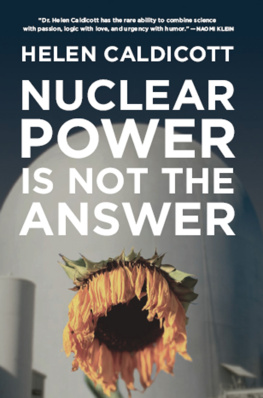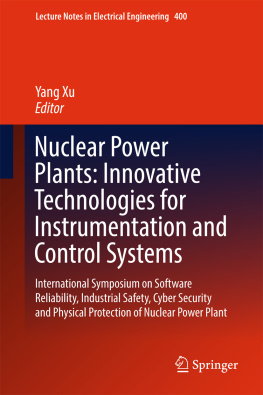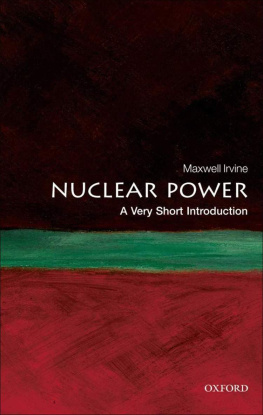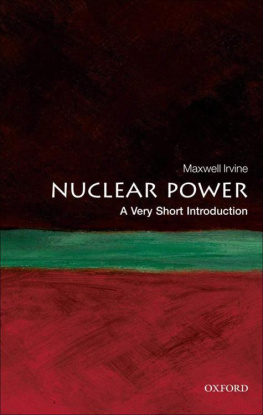
The Upside Down
Book
of
Nuclear Power
(With Musings on Energy)
SAURAV JHA

this book is dedicated to
my late mother, Indira, who struggled inordinately to take
me through the alphabet the first time round;
my dad, Sukumar, who backed me up regardless of my
standing with the alphabet;
Devapriya, originator of the upside down idea, co-surfer in
an upside down world;
and finally (though this dedication is getting longer and
longer), the atom an idea that made it all probable.
Table of Contents
| ABWR | Advanced Boiling Water Reactor |
| ADS | Accelerator Driven System |
| AERB | Atomic Energy Regulatory Board |
| AHWR | Advanced Heavy Water Reactor |
| ARS | Acute Radiation Syndrome |
| BARC | Bhabha Atomic Research Centre |
| BWR | Boiling Water Reactor |
| CSC | Convention on Supplementary Compensation for
Nuclear Damage |
| CCGT | Combined Cycle Gas Turbine |
| CTBT | Comprehensive Test Ban Treaty |
| DAE | Department of Atomic Energy |
| EBR | Experimental Breeder Reactor |
| ECCS | Emergency Core Cooling System |
| EPR | European Pressurized Water Reactor |
| ESBWR | Economically Simplified Boiling Water Reactor |
| FBR | Fast Breeder Reactor |
| FBTR | Fast Breeder Test Reactor |
| FMCT | Fissile Material Cut-off Treaty |
| FTBR | Fast Thorium Breeder Reactor |
| GCR | Gas Cooled Reactor |
| GNEP | Global Nuclear Energy Partnership |
| GWe | GigaWatt Electric |
| HLW | High-Level Waste |
| HTE | High Temperature Electrolysis |
| IAEA | International Atomic Energy Agency |
| IGCAR | Indira Gandhi Atomic Research Centre,
Kalpakkam |
| kWh | Kilo Watt Hour |
| LCOE | Levellized Cost of Electricity |
| LWR | Light Water Reactor |
| MIDC | Maharashtra Industrial Development
Corporation |
| MOX | Mixed Oxide Fuel |
| MWD/MTU | Megawatt day per metric tonne of uranium |
| NFC | Nuclear Fuel Complex, Hyderabad |
| NPCIL | Nuclear Power Corporation of India Limited |
| NPT | Nuclear Non-Proliferation Treaty |
| NSG | Nuclear Suppliers Group |
| NWS | Nuclear Weapons State |
| PFBR | Prototype Fast Breeder Reactor |
| PHWR | Pressurized Heavy Water Reactor |
| PUREX | Plutonium Uranium Extraction |
| PWR | Pressurized Water Reactor |
| RAPS | Rajasthan Atomic Power Station |
| RBMK | Reaktor Bolshoy Moshchnosti Kanalniy |
| RTG | Radioisotopic Thermoelectric Generator |
| SWU | Separative Work Unit |
| TAPS | Tarapur Atomic Power Station |
| THTR | Thorium High Temperature Reactor |
| TIFR | Tata Institute of Fundamental Research |
| WANO | World Association of Nuclear Operators |
I t is said that India has a resident deity for everything. As it well might, because nuclear power sure seems to have a God of its own. According to some schools of thought, Hanuman, the great devotee of Lord Ram and the son of Pavana, is the godhead of nuclear power. In Sanskrit anu means atom, anuman therefore refers to the atomic force. Thus, without further ado, and with a brief invocation to the patron deity of the subject, I suppose I can begin.
James Lovelock begins his brilliant book The Revenge of the Gaia by saying that nobody likes the bearer of bad news. And here I am bearer of bad news (global warming etc. etc.) writing on nuclear power, without really having any of the necessary badges of honour that might make me particularly acceptable in these our often-polemical times. I am not a bleeding-heart liberal, a sociologist, a demonstrationist, a decrier of the concept of nation. Come to think about it, Im not even a physicist! I believe in unglamorous (and certainly unfashionably geriatric) things like the fact that realpolitik is sad but true, that energy efficiency and independence are of great criticality in an India which has ambitions of attaining economic growth and prosperity in a sustainable manner. I studied economics in a rather old-fashioned way I suppose, with its emphasis on objectivity, numbers and hard facts.
However, structuring the subject of nuclear power into an even halfway-readable book was a real challenge; that is how the upside down idea came about. Now, most serious books have a glossary at the end which is very often the most succinct statement on the subject. Of course, because it is at the end, the entries are very short, and the whole exercise is relegated to the position of a mere appendix. In the Upside Down Book this marginalia is expanded into the chief tool that initiates the reader into this esoteric and (rather technical) subject.
So in a manner of speaking, the book is the (really elaborate) glossary, with a rambling essay at the end! Each letter of the alphabet has been taken sequentially and has an entry on it. You might start with whichever you like. However, the organization has also tried to maintain that each entry is not as random or discrete as it seems, and there is a linear progression too, a story if you will, which, through the twenty-six letters, expounds upon all aspects of the subject history, scientific basis, economics, moral/ethical/environmental aspects, and so on. A few chapters may seem slightly technical (N and O most of all Ive warned you fair and square!), but it seemed a pity to keep the nature of the book too rudimentary. Particularly because this subject does not quite fall in the realm of popular non-fiction!
Before I end this note I would like to say that though this is really a book about nuclear power it is set in a contemporary geopolitical context with the Indo-US nuclear deal getting some attention. Indeed, in this book I have given reasons as to why the nuclear deal makes sense. However, I must caution readers that India should always remain wary of whoever it does business with and, deal or no deal, it should constantly evaluate its relationship with the United States of America and not get misty-eyed as it once did with the Soviet Union. Because, as Lord Palmerston once put it pithily, Nations have no permanent friends and no permanent enemies. Only permanent interests.
THE FUKUSHIMA EFFECT
E ven as I write this, hundreds of thousands in Japan are struggling to rebuild their lives in the aftermath of one of the strongest earthquakes in recorded human history, and the killer tsunami that followed in its wake, in the late-afternoon of 11 March 2011. In the midst of this tremendous human tragedy, however, it is the nuclear incident at Fukushima that seems to have grabbed maximum coverage. Like in the 1980s, bad news sells radioactive bad news sells even better.
But pause we must. And in the vein of this book, objectivity should not fall prey to radiation. Nuclear abolitionists seem to believe they now have a barrage of evidence to check the onrush of the global nuclear tide we have seen ever since governments the world over realized that any strategy to fight global warming must necessarily have a nuclear component. The reasons for that thinking remain sound, despite Fukushima. As I have argued elsewhere in this book, nuclear power remains the only alternative to coal-based generation for large-scale industrial and commercial purposes (see A for An Introduction). According to a recent study by the UK government which classifies nuclear as a renewable source:
Next page
